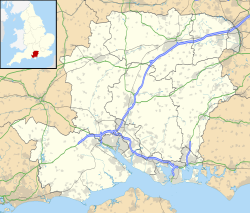| South Hayling | |
|---|---|
 | |
Location within Hampshire | |
| Area | 4.737 km2 (1.829 sq mi) |
| Population | 15,948 (2020 estimate) |
| • Density | 3,367/km2 (8,720/sq mi) |
| District | |
| Shire county | |
| Region | |
| Country | England |
| Sovereign state | United Kingdom |
| Post town | HAYLING ISLAND |
| Postcode district | PO11 |
| Dialling code | 023 |
South Hayling is a village and former civil parish on Hayling Island, about 5 miles from Havant, in the Havant district, in the county of Hampshire, England. In 2020 it had an estimated population of 15,948. [1] South Hayling BUA's classification is a "smaller seaside town". [2] In 1931 the parish had a population of 3254. [3] On 1 April 1932 the parish was abolished and merged with Havant. [4]

